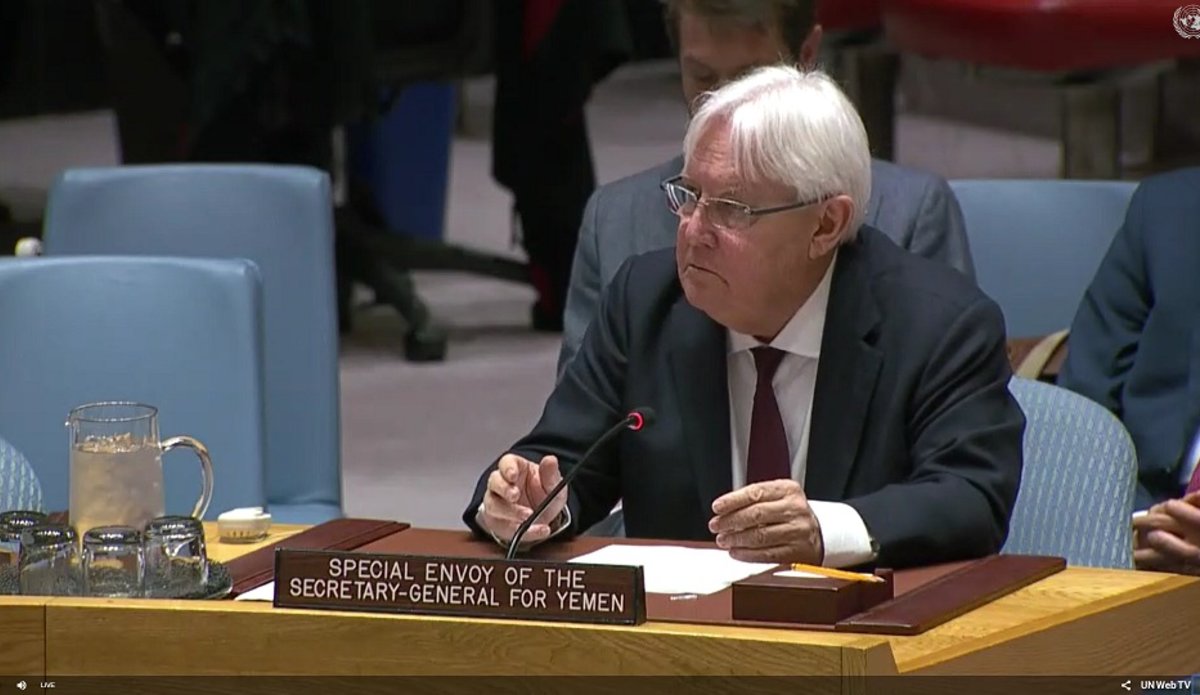Briefing of the Special Envoy of the United Nations Secretary-General for Yemen to the open session of the UN Security Council
Thank you very much Mr. President and Happy New Year to all the members,
Since I last spoke to this Council, our region has been going through a crisis, the consequences of which have threatened the gains we have been observing in Yemen. Fortunately, the immediate crisis seems to be over, and I venture to say that through the actions of many, many people, Yemen has been kept safe from such a crisis for now. This achievement, and it is a real achievement, is based on a consensus that Yemen must not be affected by regional tensions. And most importantly, in this time of crisis, we have seen no major acts of military provocation in Yemen. This is remarkable. Indeed, it has been one of the quietest weeks of the war in Yemen since the war began, with only, in this most recent period of a couple of weeks, only one airstrike; very limited military movement on the ground and no drone or missile attacks on neighboring states. So I hope, I hope, it is not premature to say that Yemen has emerged at this time unscathed.
This achievement has not come by chance. Yemeni leaders and leaders in the region have deliberately exercised restraint and withheld from acts of provocation.
Mr. President, I would like to add my condolences upon the death of His Majesty Sultan Qaboos bin Said Al Said on the 10th of January. There is no doubt that Sultan Qaboos was an inspiring leader in Oman in the field of peace and reconciliation. And I wish His Majesty Sultan Haitham bin Tariq Al Said success in leading his country in the coming years. This is of great importance to all of us focused on the issue that we’ll be discussing today.
Mr. President,
The regional crisis has tested the resilience of the various efforts being undertaken by the parties. These endeavours must make progress if we are to realize the ambition that 2020 will bring peace to Yemen.
I would like to draw the Council’s attention, with your permission, to these efforts: first of all, the de-escalation of military hostilities, and secondly, the implementation of the agreements made in Stockholm and Riyadh. And I would also like to refer, briefly to the efforts on the ancillary measures being undertaken by the parties which have value in themselves, but while also building confidence between the parties in their other endeavours.
So, where do we stand on each of these tracks?
Firstly, with regard to the de-escalation of military operations, I said to the Council in November that the air war in Yemen had reduced by 80%. This was a remarkable achievement at that time, and I think it is even more remarkable now that it has been sustained and even improved upon. Since the beginning of January, there have been nine days with no airstrikes at all. It is true, it is certainly true, and it’s tragically true, that some fronts remain active and there are still far too many civilian deaths. Nevertheless, the movement of forces and military on the ground has reduced. We are surely, and I hope this is true and I hope it will remain so, witnessing one of the quietest periods of this conflict. This is no small thing, and the fact that it has been sustained, as I have mentioned, even during a period of crisis is notable. And these efforts should not be judged by whether they achieve a perfect ceasefire, but whether the parties’ energies are directed there to away from war. Experience however tells us that military de-escalation cannot be sustained without political progress between the parties, and this has become the next challenge.
Secondly, Mr. President, I would like to comment on progress in implementing the Riyadh Agreement. I want to praise the Government of Yemen and the Southern Transitional Council, who made that agreement, supported by the Kingdom of Saudi Arabia, for their diligence and commitment in implementing those commitments. The relative improvement in security in Aden also bodes well for their efforts, and the parties’ recommitment recently to time-bound measures to support the implementation of the Riyadh agreement is a very positive sign. I know firsthand that there are daily detailed negotiations as we sit here, and I hope that we will see key appointments in Aden in the next days. I am fairly confident that the implementation of that agreement is moving in a positive direction.
Overall, this is good news, of course, but not least, because it is also a starting point for opening a new page to be dominated and noted and themed by sincere consultations between the Yemeni parties to reach a political solution to end the Yemeni crisis.
Mr. President, turning to the Stockholm Agreement, and particular as it refers to Hudaydah.
None of us should be satisfied with the record of its implementation, but we can take comfort that the United Nations and the parties remain committed and as active as ever to implement the commitments they made, more than a year ago, in Stockholm.
The parties work together on a daily basis aboard the UNMHA, that is the UN Mission for the Hudaydah agreement, vessel moored in Hudaydah port and that the joint observation posts and continue with efforts to further the implementation of that agreement. Though violence unfortunately continues in the southern districts of the governorate, the relative calm at the frontlines in Hudaydah city shows that the measures to enhance the de-escalation, the ceasefire mechanism is working, and this is something we can and should build on.
The Redeployment Coordination Committee, established by that agreement, has engaged in discussions on a roadmap now for opening humanitarian corridors that will improve access for humanitarian agencies, and I know Ramesh will be focusing on this later, and civilian movement in the governorate. I hope that they can reach an agreement on these corridors in the coming weeks, and that indeed this will pave the way for further discussions on the implementation of the redeployment of forces.
I should note that despite the achievements in Hudaydah, the persistent restrictions on the freedom of movement of UNMHA personnel remains a concern. I raised this when I was in Sana’a before Christmas. The restrictions of UNMHA’s patrols to the city and to the ports, along with their logistical and support activities contradicts the spirit of the Stockholm Agreement and I reiterate my call for their immediate resumption.
I mentioned before to this Council, Mr. President, that we have seen considerable progress related to the entry of fuel ships into Hudaydah and the collection of revenues, as agreed in the Stockholm Agreement. From the establishment of that mechanism in November until the end of 2019, more fuel has been delivered to Hudaydah than in any other equivalent period in 2019, and the sums of taxes have been collected and deposited in an account in the Central Bank of Yemen in Hudaydah. We are working with the parties to reach an agreement on how these revenues may be used urgently to contribute to the payment of salaries of civil servants, as set out in that Stockholm Agreement.
Mr. President, a brief consideration of further confidence-building measures.
The proposal for circled mercy flights refers to the WHO (World Health Organization) project that has been negotiated by WHO with the Government of Yemen and Ansar Allah over many months. These flights will transport patients who need medical attention unavailable in Yemen to agreed locations abroad. In recent weeks, WHO has benefited from an extraordinary array of diplomatic support to make these flights happen. Indeed, the Coalition has provided its own support for their project in a statement of 26 of November of last year. And I can tell you that a number of Member States have intervened at the very highest levels to clear away any obstacles to this project, and we thank them for that diligence. We are very close to seeing the first flight move 30 patients who are now waiting in Sana’a for their treatment. I really hope that by the time we meet next month, Mr. President, we will have seen that first flight happen.
Certainly, the release of six Saudi detainees by Ansar Allah on the 1st of January is further evidence of good will between the parties, and I thank Ansar Allah for this important humanitarian gesture and the International Committee of the Red Cross for their support in moving the detainees from Yemen to Saudi Arabia. But I have to say. it does fall short of the aspirations of the parties under the Stockholm Agreement and discussions on the release of many thousands of prisoners and detainees. We still hope that the parties can make this happen soon and, for our part, I intend to reconvene the prisoners exchange committee created under the Stockholm agreement, in the coming days, with the intention of substantive numbers of prisoner releases.
Mr. President,
Finally, all of these initiatives and the measures associated with them support the urgent search for a political solution and the end of the conflict in Yemen. That pursuit is not dependent, is not dependent on the success of any of them but reinforced by the success of all of them. With each positive step, we are brought closer to formally launching political consultations between the Government of Yemen and Ansar Allah. I have spoken of this in this Council on a number of occasions, with the hope that we see this happen soon.
And indeed, the significance and meaning of the initiatives that I have alluded to, only becomes real in the context of that political solution to end the conflict. We have indeed discussed, in this chamber and in consultations, the need for impatience in this respect. Yemen has recently now been brushed by potential tragedy from regional tensions and, so far, appears to have emerged unscathed. This is evidence of the leaders’ desire to keep Yemen safe from such tensions but it is a fragile safety and one that needs our diligent and continuing attention if we are able to produce that promise to the people of Yemen that this year they may see the peace they so evidently deserve.
Thank you very much.
 UN
UN







